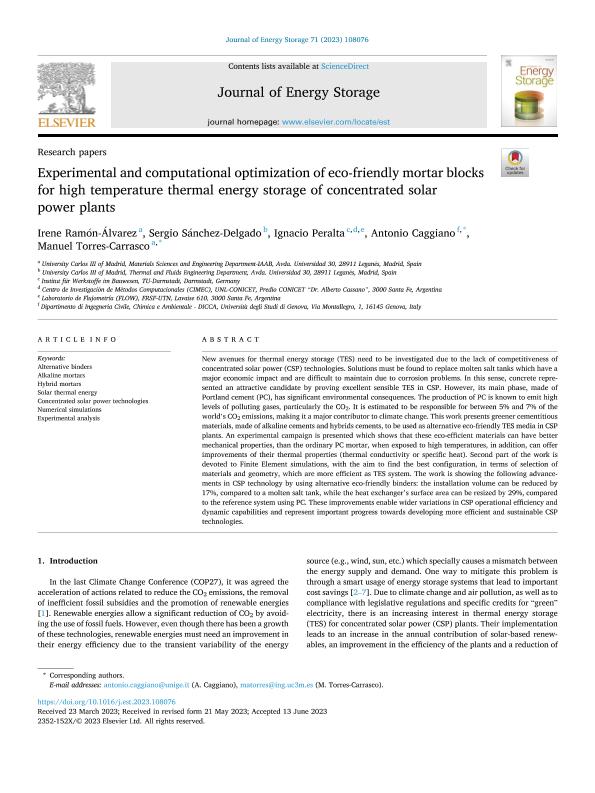Artículo
Experimental and computational optimization of eco-friendly mortar blocks for high temperature thermal energy storage of concentrated solar power plants
Ramón Álvarez, Irene; Sánchez Delgado, Sergio; Peralta, Ignacio ; Caggiano, Antonio
; Caggiano, Antonio ; Torres Carrasco, Manuel
; Torres Carrasco, Manuel
 ; Caggiano, Antonio
; Caggiano, Antonio ; Torres Carrasco, Manuel
; Torres Carrasco, Manuel
Fecha de publicación:
11/2023
Editorial:
Elsevier
Revista:
Journal of Energy Storage
e-ISSN:
2352-152X
Idioma:
Inglés
Tipo de recurso:
Artículo publicado
Clasificación temática:
Resumen
New avenues for thermal energy storage (TES) need to be investigated due to the lack of competitiveness of concentrated solar power (CSP) technologies. Solutions must be found to replace molten salt tanks which have a major economic impact and are difficult to maintain due to corrosion problems. In this sense, concrete represented an attractive candidate by proving excellent sensible TES in CSP. However, its main phase, made of Portland cement (PC), has significant environmental consequences. The production of PC is known to emit high levels of polluting gases, particularly the CO2. It is estimated to be responsible for between 5% and 7% of the world's CO2 emissions, making it a major contributor to climate change. This work presents greener cementitious materials, made of alkaline cements and hybrids cements, to be used as alternative eco-friendly TES media in CSP plants. An experimental campaign is presented which shows that these eco-efficient materials can have better mechanical properties, than the ordinary PC mortar, when exposed to high temperatures, in addition, can offer improvements of their thermal properties (thermal conductivity or specific heat). Second part of the work is devoted to Finite Element simulations, with the aim to find the best configuration, in terms of selection of materials and geometry, which are more efficient as TES system. The work is showing the following advancements in CSP technology by using alternative eco-friendly binders: the installation volume can be reduced by 17%, compared to a molten salt tank, while the heat exchanger's surface area can be resized by 29%, compared to the reference system using PC. These improvements enable wider variations in CSP operational efficiency and dynamic capabilities and represent important progress towards developing more efficient and sustainable CSP technologies.
Archivos asociados
Licencia
Identificadores
Colecciones
Articulos(CIMEC)
Articulos de CENTRO DE INVESTIGACION DE METODOS COMPUTACIONALES
Articulos de CENTRO DE INVESTIGACION DE METODOS COMPUTACIONALES
Citación
Ramón Álvarez, Irene; Sánchez Delgado, Sergio; Peralta, Ignacio; Caggiano, Antonio; Torres Carrasco, Manuel; Experimental and computational optimization of eco-friendly mortar blocks for high temperature thermal energy storage of concentrated solar power plants; Elsevier; Journal of Energy Storage; 71; 108076; 11-2023; 1-16
Compartir
Altmétricas



